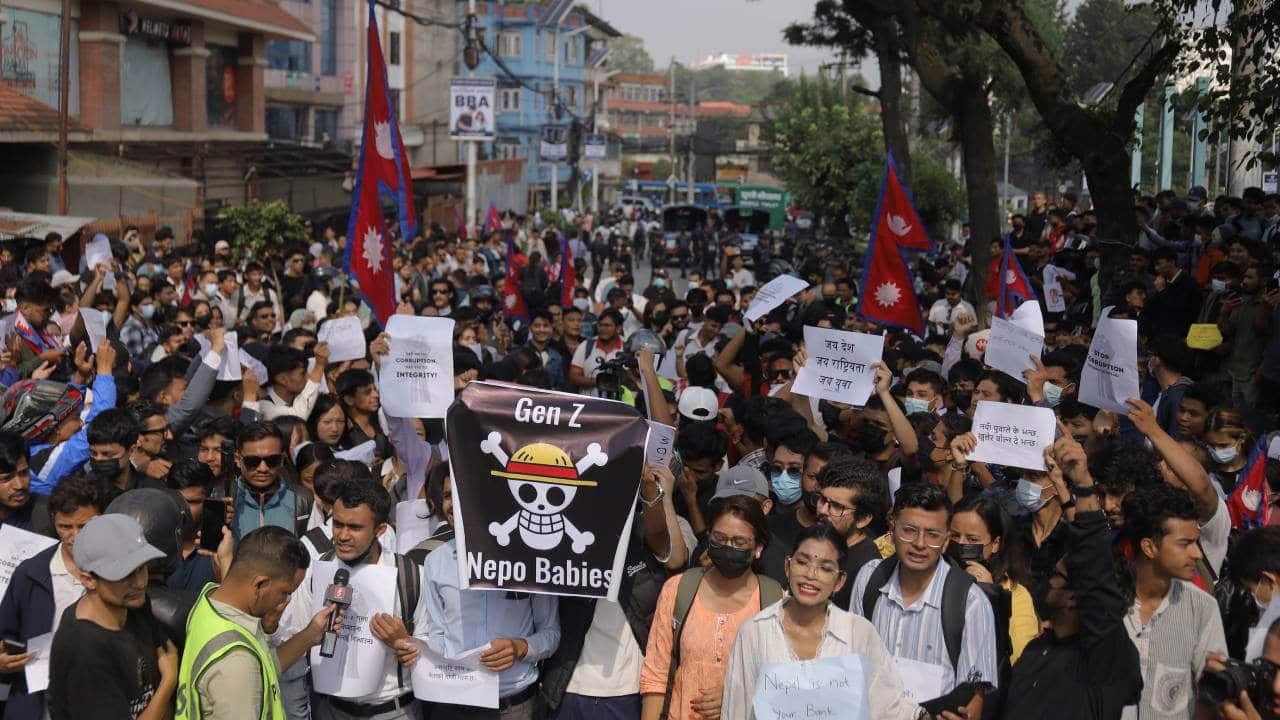Nepal’s Gen-Z Rises Up: Young Protesters Demand Accountability as Politicians Amass Wealth Amidst Struggles

Nepal’s recent protests, led by a passionate generation of young activists, have resulted in the swift downfall of the government, but the victory has come at a devastating cost. In just 48 hours, the demonstrations turned deadly, claiming 72 lives and causing extensive damage across the nation. The unrest, described as the most severe in decades, has left a profound impact on the country, with calls for accountability and a demand for change echoing through the streets. As the nation grapples with the aftermath, the voices of the youth are rising, demanding a brighter future.
Protests Sparked by Corruption and Inequality
The protests erupted on September 8, fueled by widespread anger over corruption and the exploitation of state resources by the political elite. Tanuja Pandey, a 24-year-old environmental activist and one of the protest organizers, highlighted the frustrations of her generation, stating, “We are proud, but there is also a mixed baggage of trauma, regret, and anger.” The demonstrations were a direct response to the perceived failures of the political class, which has struggled to govern effectively for decades. Ashish Pradhan, a senior adviser at the International Crisis Group, noted that the protests represented a “wholesale rejection” of the current political system.
The violence that ensued was unprecedented, with official buildings, residences of political leaders, and luxury hotels being vandalized and set ablaze. The destruction extended beyond the capital, Kathmandu, with at least 300 local government offices damaged nationwide. The financial toll of the unrest is staggering, with estimates suggesting losses could reach 3 trillion Nepalese rupees, nearly half of the country’s GDP. The Kathmandu Post reported that the damage inflicted on government services could rival the devastation caused by the 2015 earthquake, which resulted in nearly 9,000 deaths.
The Role of ‘Nepo Babies’ in the Protests
The term “nepo babies” has gained traction among protesters, referring to the children of powerful politicians who are perceived to flaunt their wealth while ordinary citizens struggle. Tanuja Pandey’s activism was partly inspired by the stark contrast between the luxurious lifestyles of these individuals and the harsh realities faced by many young Nepalis. The protests were largely leaderless, reflecting a grassroots movement driven by shared grievances and a desire for change.
The government’s decision to ban 26 social media platforms, citing their failure to register locally, further fueled the anger among the youth. Many young activists, including Pandey, used social media to rally support and share their messages against corruption. The protests were marked by a sense of unity among participants, who initially gathered peacefully to express their frustrations. However, as tensions escalated, the situation quickly spiraled out of control, leading to violent confrontations with law enforcement.
Violence and Government Response
As the protests intensified, chaos erupted in the streets. Demonstrators retaliated against police actions, setting fire to parliament and other government buildings. Eyewitness accounts describe a shift from peaceful protests to violent clashes, with reports of police using tear gas and live ammunition against protesters. The violence left many questioning the motives of those who infiltrated the peaceful gatherings, as some appeared to incite chaos.
In response to the escalating violence, the military was deployed to restore order, and a curfew was imposed in several areas. Amid the turmoil, former Supreme Court Chief Justice Sushila Karki was appointed as interim prime minister, a move that some protesters welcomed as a step toward change. However, concerns remain about the future of Nepal’s political landscape, with many expressing unease over the military’s involvement and the potential for further unrest.
Reflections on Loss and Hope for the Future
The aftermath of the protests has left families mourning the loss of loved ones, with many grappling with the harsh realities of violence and loss. Yubaraj Neupane, whose son was killed during the protests, expressed his heartbreak, stating, “We are deeply shocked because we have lost our beloved son.” The tragic deaths of young protesters have become a rallying cry for change, as families seek justice and recognition for their sacrifices.
Despite the trauma and chaos, Tanuja Pandey remains cautiously optimistic about the future. She believes that the recent events represent a political awakening for her generation, stating, “We are no longer willing to stay silent or accept injustice.” As Nepal navigates this tumultuous period, the voices of its youth are becoming increasingly prominent, demanding accountability and a brighter future for their country.
Observer Voice is the one stop site for National, International news, Sports, Editor’s Choice, Art/culture contents, Quotes and much more. We also cover historical contents. Historical contents includes World History, Indian History, and what happened today. The website also covers Entertainment across the India and World.
Follow Us on Twitter, Instagram, Facebook, & LinkedIn

